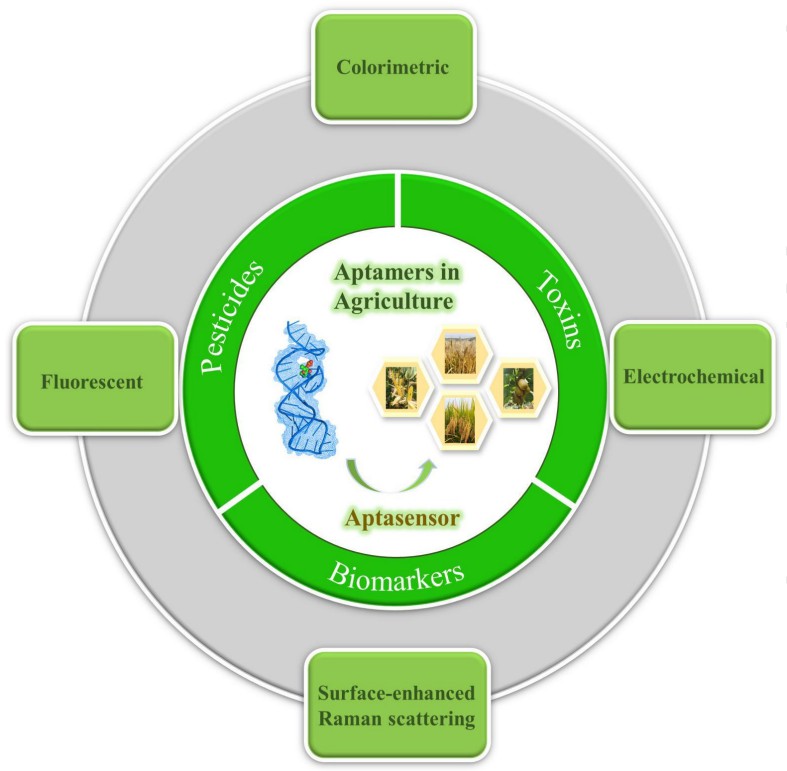Pesticide contamination in the food chain and the environment is a worldwide problem that requires active monitoring to ensure safety. Unfortunately, standard pesticide analysis based on mass spectrometry requires much time, money, and effort. Therefore, simple, reliable, cost-effective, and field-applicable methods for pesticide detection are being actively developed. Nucleic acid aptamers are short single-stranded DNA (ssDNA) or ssRNA oligonucleotides that can form unique three-dimensional structures. Aptamers can selectively bind to their targets with high affinity. These targets include proteins, small organic compounds, ions, and whole organisms such as viruses, mammalian cells, and pathogenic bacteria. Nucleic acid aptamers have been characterized and widely used for a variety of targets in agriculture, and in particular, biosensors for aptamers can utilize aptamers, short single-stranded DNA or RNA, as pesticide recognition elements, in combination with a variety of innovative biosensing technologies, to achieve specific and sensitive detection of pesticide residues.
 Fig. 1. Nucleic acid aptamers for pesticides, toxins, and biomarkers in agriculture. (Hu et al., 2022)
Fig. 1. Nucleic acid aptamers for pesticides, toxins, and biomarkers in agriculture. (Hu et al., 2022)
Lifeasible is an industry leader in the development of biopesticides, offering a wide range of effective solutions for the development of biopesticides. Based on our advanced technology platform and experienced team of experts, we aim to develop and characterize nucleic acid aptamers for a variety of targets in agriculture, including the detection of pesticides (herbicides, insecticides, and fungicides), toxins, crop biomarkers, and plant growth regulators.
Our experts are dedicated to constructing aptamer sensors for detecting pesticides in various sample matrices using sensing strategies such as fluorescence, colorimetry, surface-enhanced Raman scattering (SERS), and electrochemistry. This approach improves the efficiency of pesticide analysis and is affordable, sensitive, specific, user-friendly, fast, and robust; requires no equipment, and can be delivered to the end user.
Nucleic acid aptamers can be synthesized and modified in the laboratory and conjugated to a set of targets. We offer a variety of pesticide nucleic acid aptamer solutions, including:
Our Systematic Evolution of Fixed Exponentially Enriched Ligands (SELEX) and non-fixed SELEX methods allow for the systematic in vitro generation of aptamers for a wide range of targets from many synthetic oligonucleotide sequences in the range of 1012-1015. We have successfully screened a series of nucleic acid aptamers against organochlorine, organophosphorus, neonicotinoid, and carbamate pesticides.
Aptamers have limited chemical diversity because they are constructed from combinations of only four nucleobases to produce specific conformations and binding motifs to recognize target molecules specifically. We offer a variety of strategies to increase the affinity and selectivity of aptamers for targets, including, but not limited to, negative selection, counter-selection, stringency modification, aptamer length optimization, and post-selection modification.
Pesticides are much smaller in size than aptamers and rarely reveal their interaction events, making it difficult not only to isolate them but also to characterize their basic properties. We offer a variety of methods to characterize aptamers for general properties (e.g., secondary and tertiary conformations) and ligand binding properties (e.g., affinity and selectivity), such as computational analysis and circular dichroism (CD) spectroscopy, computational structure prediction, nuclear magnetic resonance (NMR), X-ray diffraction, isothermal titration calorimetry (ITC), fluorescence saturation binding assays, capillary electrophoresis (CE), etc. We provide detailed structural and kinetic information on aptamer-ligand complexes to help you select the right aptamer for your project.
Lifeasible has extensive research experience in developing nucleic acid aptamers against pesticides. Our solutions are critical to the public's adoption of such tests for pesticide management and control in remote areas, farms, and homes. Aptamer sensors are superior to some already developed technologies in detecting various chemical and biological targets in agricultural production, products, and food materials. Contact us today to learn more about our solutions.
Reference
Lifeasible has established a one-stop service platform for plants. In addition to obtaining customized solutions for plant genetic engineering, customers can also conduct follow-up analysis and research on plants through our analysis platform. The analytical services we provide include but are not limited to the following:
Get Latest Lifeasible News and Updates Directly to Your Inbox
Mechanisms Regulating Plant Chloroplast Biogenesis
April 15, 2025